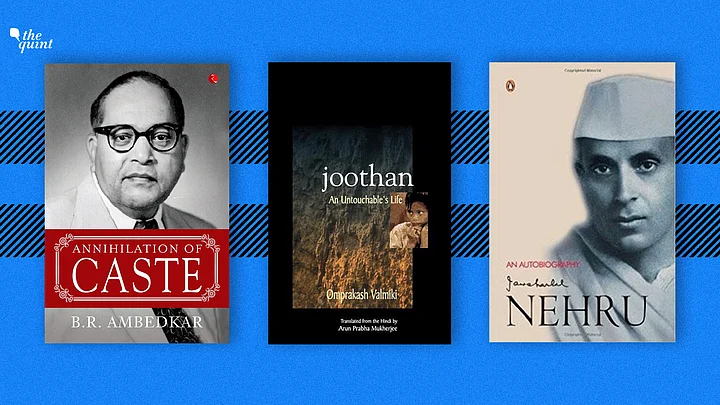Reading is a safe hobby, I was told. Unlike sports, there are no bodily injuries to be sustained. No extensive riyaaz at the cost of everything else, like is needed in pursuing classical dance or music. Reading only shakes the soul; breaks down worldviews, shatters perceptions, opens up the world.
Until the Bombay High Court disabused me of my notion. On 28 August, the Bombay High Court asked Elgar Parishad-Bhima Koregaon case accused Vernon Gonsalves to explain why he owned “objectionable material” like a copy of "War and Peace." After the furore on Twitter, judge clarified that he meant "War and Peace in Junglemahal" by Biswajit Roy. But a book, is a book.
Suddenly, the bookshelf in my home was not a place of learning anymore, but evidence of a dangerous crime.
But now that I know I run the risk of running afoul of the Indian state through, surprisingly, the books I read, it's best to come clean. Here, in no order, are a list of books which have shaped my worldview.
1. Annihilation of Caste by BR Ambedkar
Everything written by BR Ambedkar is a revelation, but especially this undelivered speech written by him in 1936. A slim volume, Annihilation of Caste may seem like an easy read. But it contains some hard truths about casteism in India, as relevant in a 2019 marred by news of mob lynchings, as it was then. The book, originally written as a speech to be delivered at the annual conference of the "Jat-Pat Todak Mandal" (Society for abolition of caste system), was considered too controversial in its arguments against orthodox Hindu religion. The arguments still ring true. Growing up in a relatively caste-agnostic Delhi, when I first read Annihilation of Caste as a graduate student, I felt my world realigning. As I looked up after turning the last page of the book, it was impossible to "forget caste" ever again.
2. Ghashiram Kotwal by Vijay Tendulkar
A play written by Vijay Tendulkar in 1972, and performed innumerable times since, Ghashiram Kotwal is the finest analysis of power and corruption I've read, one that even judges and politicians would like to read. A historical play written in the Marathi "tamasha" style, the two main protagonists of the play are Nana Phadnavis, a powerful minister in the court of the Pune Peshwa and the police chief of Pune ie Ghashiram Kotwal. The book is a great read, but the play truly impacts you when you watch it being performed, most famously by Jabbar Patel. Luckily for us, a YouTube video of the play exists.
3. My Experiments with Truth by MK Gandhi & An Autobiography: Toward Freedom by Jawaharlal Nehru
I don't know if it was just me, but I spent a significant part of my childhood reading political autobiographies. And the two autobiographies which taught me the most are by two leaders whose legacy is being contested everyday in 2019; appropriating Gandhi & pillorying Nehru is considered fashionable nowadays, after all. But both these autobiographies – different as they are nature – are a reminder of a time when principles weren't secondary to politics, ideological disagreements weren't personal and India was more an idea, than a nation. Contemporary critiques (and in the case of Nehru, a demonisation of his legacy) of the two leaders notwithstanding, these two books should be read by everyone.
4. The Other Side of Silence by Urvashi Butalia
The Other Side of Silence by Urvashi Butalia is a classic in Parititon literature, and rightly so. Published in 1998, the book was the first attempt at documenting oral histories of the Partition. Through the stories in the book – the soldier who couldn't decide whether to join India or Pakistan's Army, the harrowing story of rape survivors, people who lost entire families in the violence – Butalia argues that Partition is an aspect of Indian history which must not be forgotten. She turns a lens on the people when describing a big, seismic, historic event and reminds us that the enemy may not be so unfamiliar after all.
4. Ants Among Elephants by Sujatha Gidla
When this book released in 2017, I recommended it to everyone I know. And sometimes, even to those I didn't know. Ants Among Elephants: An Untouchable Family and the Making of Modern India by Sujatha Gidla is that important a book. A conductor on the New York Subway and now an author, Gidla takes us back to caste-riven Andhra Pradesh of the 1970s. It's a story of India which hasn't been told too many times in literature. (Maybe the last time we saw such a narrative was in Omprakash Valmiki's Jhoothan). Gidla writes of crushing poverty, professors deliberately failing lower-caste students, and people's movements which fought for a caste-free India. In Ants Among Elephants, the India you encounter is a deeply unfair one. Making it a dangerous read, but precisely why, an essential read.
What does your list of #DangerousBooks looks like? Let us know in the comments below.
(At The Quint, we question everything. Play an active role in shaping our journalism by becoming a member today.)
